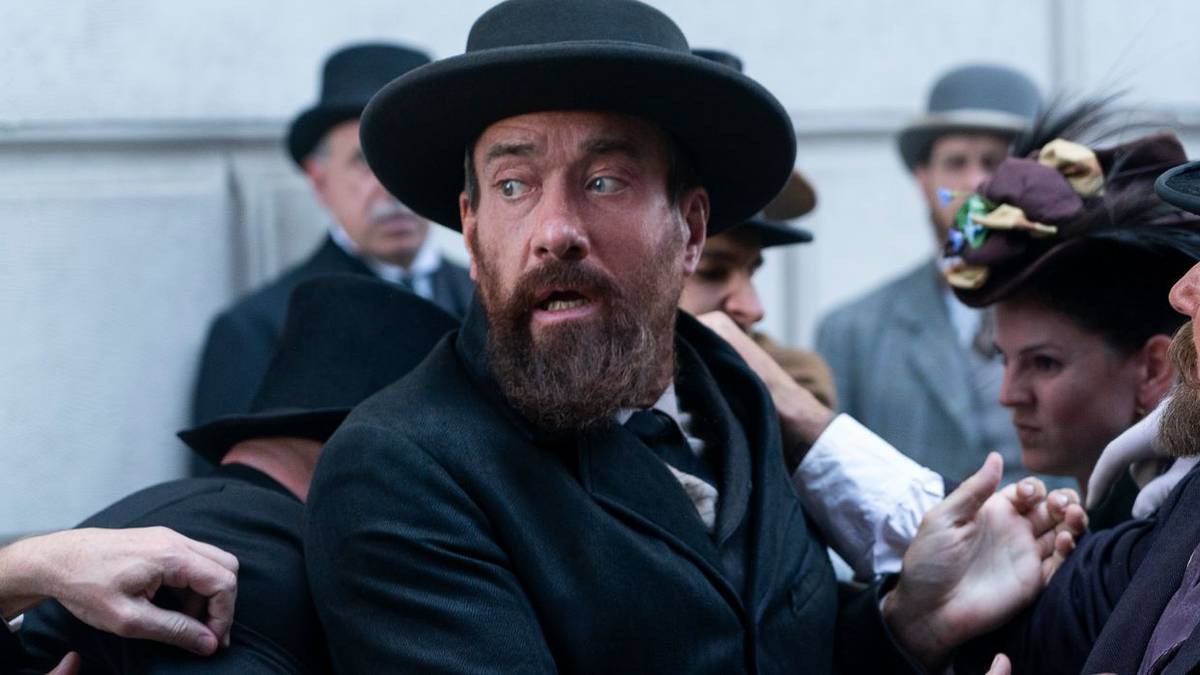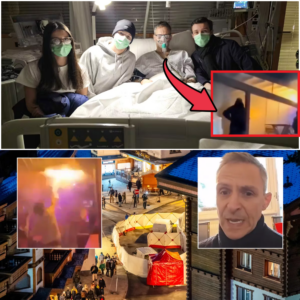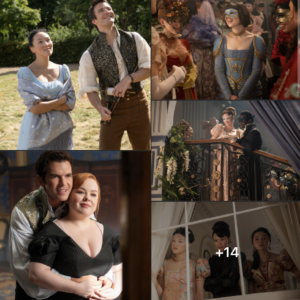In the crowded arena of prestige television, where dynastic feuds and shadowy conspiracies reign supreme, Netflix has unleashed a storm that few could have anticipated. “Death by Lightning,” the blistering four-episode limited series starring Matthew Macfadyen and Michael Shannon, isn’t just a historical drama—it’s a visceral gut-punch, a masterclass in human frailty, and a haunting reminder of how thin the line is between ambition and madness. Premiering on November 6, 2025, this adaptation of Candice Millard’s gripping 2011 nonfiction book Destiny of the Republic has viewers worldwide reeling, their screens dimmed only after marathon binges that leave them shaken, tear-streaked, and inexplicably yearning for more. I thought I was prepared for another slice of period intrigue, but nothing—absolutely nothing—could have braced me for the raw, unrelenting force of these performances. As the credits rolled on that final episode, I sat frozen in the dim glow of my living room, chest heaving, mind fractured like a storm-tossed sky. This isn’t mere entertainment; it’s an emotional ambush, a narrative lightning strike that illuminates the darkest corners of power and delusion.
At its core, “Death by Lightning” resurrects a forgotten chapter of American history: the meteoric rise and tragic fall of James A. Garfield, the 20th president of the United States, whose six-month tenure in 1881 ended in one of the nation’s most bizarre assassinations. Garfield, portrayed with a quiet, seething intensity by Michael Shannon, emerges not as a larger-than-life icon but as a profoundly human figure—a reluctant leader thrust into the Oval Office amid the rubble of the Civil War. Elected in a razor-thin Republican convention, Garfield inherits a fractured nation still grappling with Reconstruction’s scars, rampant political patronage, and the toxic spoils system that turned public service into a personal fiefdom. His vision? Radical reform: dismantling corruption, championing civil service based on merit, and bridging the chasms of race and class that threatened to swallow the young republic whole. Yet, as Garfield navigates this viper’s nest—clashing with machine bosses like Senator Roscoe Conkling (a steely Shea Whigham) and forging uneasy alliances with rivals like Vice President Chester A. Arthur (Nick Offerman in a pitch-perfect pivot from mustache-twirling villainy to reluctant redemption)—he becomes the unwitting obsession of a man whose admiration curdles into catastrophe.

Enter Charles J. Guiteau, played by Matthew Macfadyen in what may be the most unnervingly brilliant performance of his career. Fresh off his Emmy-winning turn as the hapless yet scheming Tom Wambsgans in HBO’s Succession, Macfadyen channels a very different breed of loser here: a delusional dreamer, a self-proclaimed prophet whose life is a tapestry of failed schemes, unpaid debts, and unshakeable conviction in his own divine destiny. Guiteau isn’t your typical villain—no cackling megalomaniac or cold-blooded killer. He’s a pathetic everyman, a fringe figure scraping by in the shadows of Gilded Age Washington, convinced that his rambling speeches and half-baked theology entitle him to a consular post abroad. When Garfield’s ascension aligns with Guiteau’s fevered fantasies, the assassin’s path crystallizes in a haze of messianic fervor. Macfadyen’s portrayal is a tour de force of subtle horror: his wide-eyed earnestness masking a bottomless void, his awkward charm curdling into menace with every misplaced syllable. One scene, where Guiteau rehearses his “fateful” act in a dingy boarding house, had me gripping the armrest, laughter bubbling up only to choke into dread. It’s slimy, desperate, and utterly compelling—a reminder that the most dangerous minds are often the most ordinary.
What elevates “Death by Lightning” beyond a mere retelling of dusty history is its unflinching exploration of the psyches at play. Creator and showrunner Mike Makowsky, drawing from Millard’s book that he devoured in a single, sleepless night, weaves a tapestry of absurdity and tragedy. The series doesn’t shy away from the farce inherent in Garfield’s era: the backroom deals in smoke-filled parlors, the parade of sycophants besieging the White House for plum jobs, the sheer incompetence of medical “experts” who prolong Garfield’s agony with unsterilized probes and quack remedies. Yet beneath the dark comedy lurks a profound empathy. Shannon’s Garfield isn’t a saintly martyr; he’s a man of fierce intellect and fragile health, haunted by survivor’s guilt from his Civil War service and a deep-seated compassion that makes him vulnerable. “America was a real mess when he became president,” Shannon has reflected, capturing the era’s disarray with a gravitas that grounds the spectacle. His scenes—debating reform with a skeptical cabinet, sharing tender moments with his wife Lucretia (Betty Gilpin, radiant in her portrayal of a steely First Lady blindsided by White House life)—pulse with a curiosity and decency that’s almost painful to watch in our cynical age.
Gilpin’s Crete Garfield anchors the domestic heart of the story, her quiet strength a counterpoint to the political maelstrom. As the president’s wife, thrust from Ohio obscurity into society’s glare, she navigates grief, gossip, and the relentless scrutiny of a press hungry for scandal. Her chemistry with Shannon crackles with understated intimacy: a shared glance across a crowded ballroom speaks volumes about a partnership forged in hardship. Offerman, meanwhile, steals every frame as Arthur, the dandyish VP whose transformation from spoils-system enforcer to Garfield’s unlikely champion adds layers of wry humor and pathos. Bradley Whitford brings his trademark smarm to Senator James Blaine, the silver-tongued power broker whose ambitions nearly derail the Republican ticket. And in supporting turns, Vondie Curtis-Hall as Frederick Douglass delivers fiery orations that underscore the series’ commitment to amplifying Black voices in Reconstruction’s twilight, while Tuppence Middleton’s Kate Chase Sprague embodies the era’s social whirlwinds with elegant ferocity.
Directed entirely by Matt Ross—known for the intimate indie gem Captain Fantastic and the biting political satire Gaslit—”Death by Lightning” moves with a taut, propulsive rhythm that belies its period trappings. Ross, a filmmaker unafraid of bold swings, films the White House not as a monument but as a pressure cooker: claustrophobic corridors echoing with whispers, sun-dappled gardens masking betrayals. The Budapest locations stand in admirably for 1880s Washington, their grand facades lending an air of faded opulence. Ramin Djawadi’s score, with its swelling strings and ominous percussion, evokes the thunder of the title—a nod to Garfield’s own fatalistic quip about assassination being as unpredictable as a bolt from the blue. Production spanned six years, from Makowsky’s initial pitch under the banner of Game of Thrones showrunners David Benioff and D.B. Weiss (who executive produce here) to the grueling 2024 shoot amid pandemic aftershocks. The result is a visual feast: sumptuous costumes in muted earth tones, cinematography that shifts from warm hearthside glows to stark, shadow-drenched interrogations.
But it’s the thematic resonance that truly electrifies. In an election cycle scarred by division and distrust, “Death by Lightning” feels eerily prescient. Garfield’s crusade against the spoils system—where loyalty trumped competence—mirrors today’s battles over meritocracy and influence-peddling. Guiteau’s unraveling, fueled by a cocktail of religious mania and political rejection, echoes the lone-wolf extremists who haunt modern headlines. Makowsky doesn’t preach; he immerses. One episode’s centerpiece, a raucous nominating convention alive with brass bands and backstabbing, unfolds like a fever dream of democracy’s underbelly—boisterous, chaotic, and perilously close to collapse. “It’s about the psychology of every character,” Shannon notes, emphasizing how the series humanizes even the fringes. Macfadyen echoes this, describing Guiteau not as a monster but a man adrift: “All his energy goes into the Garfield basket, and that becomes his world.” Their climactic confrontation, filmed late in production to capture the actors’ frayed nerves, is a masterstroke of restraint—no bombast, just two souls colliding in quiet devastation.
Critics have been swift to crown it a triumph. The Guardian hails Macfadyen as “utterly brilliant in every moment,” praising the series’ punchy distillation of a sprawling saga. Roger Ebert awards it 3.5 stars, lauding its linear storytelling and “refreshingly honest” flashbacks that deepen rather than distract. The New York Times calls it “history as comedy and tragedy,” a timely salve for political disillusionment laced with character-driven wit. On Rotten Tomatoes, it boasts a 91% fresh rating, with audiences at 73%—a testament to its intellectual heft occasionally clashing with visceral expectations. Metacritic’s 81/100 signals universal acclaim, spotlighting the cast’s alchemy in turning footnotes into flesh-and-blood icons. Even skeptics concede: in a landscape bloated with true-crime retreads, this is prestige TV with purpose, blending The Crown‘s elegance with Mindhunter‘s psychological probe.
Yet for all its accolades, “Death by Lightning” isn’t flawless. At four episodes, it races toward its inexorable end, occasionally skimping on subplots—like the intriguing tensions in Garfield’s cabinet or Guiteau’s fractured family—that could have bloomed into fuller portraits. The medical horror of Garfield’s lingering death, drawn from Millard’s meticulous research, borders on the grotesque, testing viewers’ stomachs with graphic depictions of sepsis and experimental “treatments.” And while the series nods to racial inequities through Douglass’s advocacy and Dr. Charles Purvis’s (Shaun Parkes) pioneering care, it could delve deeper into the era’s Black political awakening. Still, these are quibbles in the face of such audacious storytelling. Ross and Makowsky trust their audience to connect the dots, leaving us to ponder: What if Garfield had lived? What reforms might have flowered, averting decades of graft?
As the finale fades—Garfield’s legacy a flickering ember against the gathering dark—you’re left not with closure but a howling void. Begging for a Season 2 feels absurd; this is a limited series, self-contained and searing. But in that ache lies its genius: it forces us to confront the what-ifs, the fragile threads of history that bind us still. Netflix has indeed crowned a new king—not in spectacle, but in soul-shattering truth. “Death by Lightning” demands your attention, your empathy, your outrage. Watch it, and prepare to be struck. You won’t emerge unscathed, but you’ll never forget the jolt.

